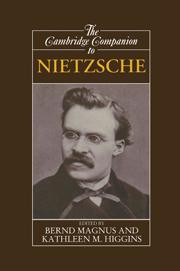Book contents
- Frontmatter
- Introduction to the Cambridge companion to Nietzsche
- Part I Introduction to Nietzsche's works
- Part II The use and abuse of Nietzsche's life and works
- 2 The hero as outsider
- 3 Nietzsche and the Judaeo-Christian tradition
- 4 Nietzsche's political misappropriation
- Part III Nietzsche as philosopher
- Part IV Nietzsche's influence
- Selected bibliography
- Index
4 - Nietzsche's political misappropriation
from Part II - The use and abuse of Nietzsche's life and works
Published online by Cambridge University Press: 28 May 2006
- Frontmatter
- Introduction to the Cambridge companion to Nietzsche
- Part I Introduction to Nietzsche's works
- Part II The use and abuse of Nietzsche's life and works
- 2 The hero as outsider
- 3 Nietzsche and the Judaeo-Christian tradition
- 4 Nietzsche's political misappropriation
- Part III Nietzsche as philosopher
- Part IV Nietzsche's influence
- Selected bibliography
- Index
Summary
II faut être absolument moderne. [It is necessary to be absolutely modern.] (Arthur Rimbaud)
There is nothing for it: one must go forward, that is step by step further into decadence. (F. Nietzsche, “For the Ear of Conservatives” Twilight of the Idols)
Other world! There is no other world! Here or nowhere is the whole fact. (R. W. Emerson)
I want to write here about the political uses made of Nietzsche, about what Nietzsche says about politics (broadly understood), and about the politics of reading and writing about Nietzsche. Twenty-five years ago few people would have cared. Nietzsche was a minor figure, stimulating to adolescents, without rigor, a bit silly. Now he is a minor industry in the intellectual professions. Everyone is writing about Nietzsche, some their third or fourth book. Articles appear everywhere: The bastions and inner walls of the most analytic redoubts have fallen,- journals of literature both learned and popular vie for text. Nietzsche seems inexhaustible - he is available, it seems, to everyone. Everything in Nietzsche seems living. Yet if everything is living, everything about Nietzsche also seems fragile.
I want also to say something here about the various claims that have been made on Nietzsche. I do not want so much to argue that Nietzsche is or is not the ally of a particular political persuasion as much as to investigate why he lends himself to such a wide range of positions, and what it means about a writer that he can be subject to so many varying claims of political allegiance. Most importantly, I wish to raise the question of what it means for a writer, such as Nietzsche, to resist the currently available political identities.
- Type
- Chapter
- Information
- The Cambridge Companion to Nietzsche , pp. 119 - 148Publisher: Cambridge University PressPrint publication year: 1996
- 12
- Cited by

